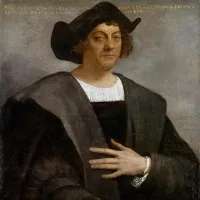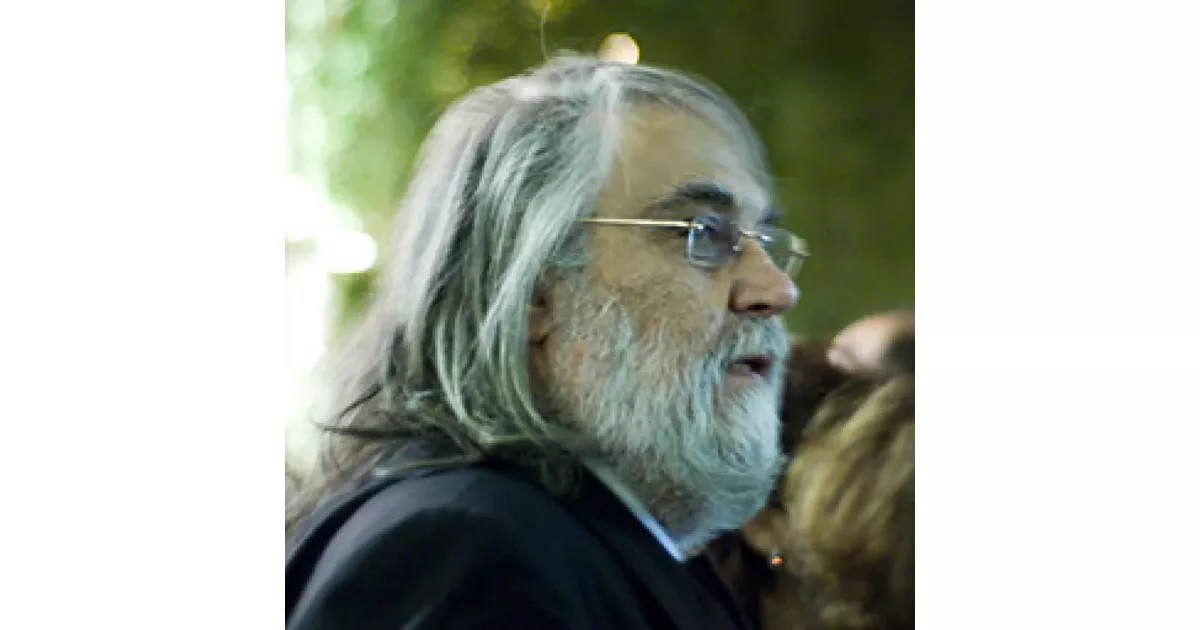Vangelis, born Evangelos Odysseas Papathanassiou, was a Greek composer renowned for his contributions to electronic, progressive, ambient, and orchestral music. His notable works include the Academy Award-winning score for the film "Chariots of Fire" and soundtracks for movies like "Blade Runner," "Antarctica," and "1492: Conquest of Paradise." He also created the music for the iconic 1980 PBS documentary series "Cosmos: A Personal Voyage."
1924: Use of 'L'Enfant' Melody in 'Chariots of Fire'
The melody of Vangelis's track "L'Enfant" was adapted into a marching band format for the 1924 Summer Olympics opening ceremonies scene in the film 'Chariots of Fire'.
March 1943: Birth of Evangelos Odysseas Papathanassiou
Evangelos Odysseas Papathanassiou, later known as Vangelis, was born in March 1943.
1963: Formation of The Forminx
Vangelis formed the five-piece rock band The Forminx with school friends in 1963.
1966: Disbandment of The Forminx
The Forminx disbanded in 1966.
1967: Formation of Aphrodite's Child
Vangelis formed the psychedelic/progressive rock band Aphrodite's Child in 1967.
1967: Score for To Prosopo tis Medousas
Vangelis wrote the score for the film "To Prosopo tis Medousas" in 1967.
1968: Release of End of the World
Aphrodite's Child released their debut album, "End of the World", in 1968.
1968: Inspiration from the French Student Riots
Vangelis was moved by the 1968 French student riots.
1968: Score for Apollo Goes on Holiday
Vangelis wrote the score for the film "Apollo Goes on Holiday" in 1968.
1969: Release of It's Five O'Clock
Aphrodite's Child released their second album, "It's Five O'Clock", in 1969.
1970: Score for Sex Power
Vangelis composed the score for the film "Sex Power" in 1970.
1971: Split of Aphrodite's Child
Aphrodite's Child split in 1971 due to increasing tensions during the recording of their album "666".
1971: Jam Sessions in London
Vangelis participated in several jam sessions in London in 1971, the recordings of which were later released without his permission.
1972: Release of 666
Aphrodite's Child, Vangelis' band, released their third album, "666", in 1972.
1972: Release of Fais que ton rêve soit plus long que la nuit
Vangelis released his first solo album, "Fais que ton rêve soit plus long que la nuit", in 1972.
May 1973: Royal Festival Hall Performance
In May 1973, Vangelis performed at the Royal Festival Hall in London, supporting the band Tempest. However, he later reflected on this concert as a failure.
1973: Release of L'Apocalypse des animaux
Vangelis released the soundtrack album "L'Apocalypse des animaux", recorded for a 1970 wildlife documentary series, in 1973.
February 1974: Paris Olympia Concert
Vangelis held a concert at the Paris Olympia in February 1974, where he performed alongside the group Odyssey.
1974: Collaboration with Claudio Baglioni
In 1974, Vangelis collaborated with Italian singer Claudio Baglioni on the album 'E tu....' This album achieved significant commercial success, reaching the top spot on the Italian sales charts and becoming the sixth best-selling album in Italy that year.
1974: Score for Amore
Vangelis composed the score for the film "Amore" in 1974.
August 1975: Signing with RCA Records
In August 1975, Vangelis signed a four-album deal with RCA Records, marking a significant step in his career.
1975: Release of 'Do You Hear the Dogs Barking?' Score
Vangelis composed the score for the film 'Do You Hear the Dogs Barking?', directed by François Reichenbach, which was released in 1975.
1975: Relocation to London
Vangelis relocated to London in 1975 and built his home recording facility, Nemo Studios.
1976: Collaborations with Patty Pravo and Milva
Vangelis began working with Italian singers Patty Pravo and Milva in 1976, releasing the album 'Tanto' with Pravo.
1976: Release of 'La Fête sauvage' Score
Vangelis released his second soundtrack for a Rossif animal documentary, 'La Fête sauvage', in 1976, blending African rhythms with Western music.
1976: Release of Albedo 0.39
Vangelis released the album "Albedo 0.39" in 1976.
1976: Royal Albert Hall Concert
Vangelis's album "Heaven and Hell" was performed live at the Royal Albert Hall in 1976.
1977: Vangelis Adopts the Yamaha CS-80 Synthesizer
Vangelis incorporated the Yamaha CS-80 polyphonic synthesizer into his music in 1977.
1977: Release of 'Spiral'
Vangelis released 'Spiral', his third album with RCA Records, in 1977, drawing inspiration from Tao philosophy.
1978: Release of 'Beaubourg'
Inspired by his visit to the Centre Georges Pompidou, Vangelis released 'Beaubourg', his fourth album with RCA Records, in 1978.
1978: Unauthorized Release of Hypothesis and The Dragon
Recordings from Vangelis' 1971 jam sessions in London were released without his permission as the albums "Hypothesis" and "The Dragon" in 1978. He took legal action and had them withdrawn.
1979: Release of 'Opéra sauvage' Score
Continuing his collaboration with Rossif, Vangelis released his third soundtrack for the documentary 'Opéra sauvage' in 1979.
1979: Signing with Polydor Records and Release of 'China'
In 1979, Vangelis signed with Polydor Records and released 'China', an album inspired by Chinese culture.
1979: Start of Collaboration with Jon Anderson
Vangelis began a more extensive collaboration with Jon Anderson in 1979, forming the duo Jon and Vangelis.
1979: Release of China and Start of Collaboration with Jon Anderson
Vangelis released the album "China" in 1979. He also began performing in a duo with Yes vocalist Jon Anderson this year.
1980: Music Featured in 'Cosmos: A Personal Voyage'
Excerpts from Vangelis's albums 'Heaven and Hell' and 'Albedo 0.39' were used in the soundtrack of Carl Sagan's 1980 television documentary series 'Cosmos: A Personal Voyage'.
1980: Release of 'Short Stories'
Jon and Vangelis released their debut album 'Short Stories' in 1980, which reached number 4 in the UK charts.
1980: Score for Cosmos: A Personal Voyage
Vangelis composed the score for the 1980 PBS documentary series "Cosmos: A Personal Voyage" by Carl Sagan.
1981: Collaboration on Blade Runner
In 1981, Vangelis began working with director Ridley Scott on the score for the science fiction film Blade Runner, set to release the following year.
1981: Release of 'The Friends of Mr Cairo'
Jon and Vangelis released their second album, 'The Friends of Mr Cairo', in 1981.
1981: Score for 'Pablo Picasso Painter'
Vangelis composed the score for the documentary film 'Pablo Picasso Painter' by Frédéric Rossif in 1981.
1981: Academy Award for Chariots of Fire
Vangelis won an Academy Award for Best Original Score for the film "Chariots of Fire" in 1981.
1981: Release of Ich hab' keine Angst with Milva
Vangelis's collaboration with Milva continued with the release of 'Ich hab' keine Angst' (also released in French as 'Moi, Je N'ai Pas Peur') in 1981. The album achieved notable success, particularly in Germany.
1981: Release of 'Chariots of Fire' Soundtrack
Vangelis's soundtrack for the film 'Chariots of Fire' was released in 1981, gaining significant commercial success and raising his profile.
March 1982: Academy Award Win for 'Chariots of Fire'
In March 1982, Vangelis won the Academy Award for Best Original Music Score for 'Chariots of Fire'.
1982: Possible Marriage to Vana Veroutis
A 1982 interview hinted at Vangelis' previous marriage to Greek singer Vana Veroutis, who contributed vocals to some of his recordings.
1982: Blade Runner Release and Critical Acclaim
Blade Runner, scored by Vangelis, was released in 1982. The film garnered critical praise for Vangelis' score, with reviewers noting its contribution to the film's dystopian atmosphere and its reflection of the protagonist's emotional state. The score received nominations for both a BAFTA and a Golden Globe award.
1982: Use of 'L'Enfant' in 'The Year of Living Dangerously'
The track "L'Enfant" from Vangelis's 'Opéra sauvage' was featured in the 1982 film 'The Year of Living Dangerously' directed by Peter Weir.
1982: Score for 'Missing' and BAFTA Nomination
Vangelis composed the score for the Costa-Gavras film 'Missing' in 1982, earning him a BAFTA nomination for Best Film Music.
1982: Scores for Blade Runner and Missing
Vangelis composed the scores for the films "Blade Runner" and "Missing" in 1982.
1983: Release of 'Private Collection'
Jon and Vangelis released their third album, 'Private Collection', in 1983.
1983: Score for Antarctica
Vangelis composed the score for the film "Antarctica" in 1983.
1983: Release of 'Antarctica' Score
Vangelis composed the score for the film 'Antarctica' (Nankyoku Monogatari) in 1983, a film that became one of the highest-grossing films in Japan's history.
1983: Composing for Elektra and First Ballet Score
Vangelis delved into composing for ballet and stage productions in the early 1980s. In 1983, he wrote the music for Michael Cacoyannis' production of the Greek tragedy 'Elektra,' starring Irene Papas, performed at the Epidavros amphitheater in Greece. The same year, Vangelis composed his first ballet score for a production by Wayne Eagling, performed by Lesley Collier and Eagling at an Amnesty International gala at the Drury Lane theatre.
1984: The Yamaha CS-80: A Pivotal Instrument in Vangelis' Career
By 1984, the Yamaha CS-80 had become a cornerstone of Vangelis' sonic identity. He praised its expressive capabilities, likening it to a "real instrument."
1984: Ballet Performance at Sadler's Wells
In 1984, the Royal Ballet School staged a performance of Vangelis's ballet score at the Sadler's Wells theatre.
1984: 'Chariots of Fire' Theme at the Winter Olympics
The theme from 'Chariots of Fire' was used during the 1984 Winter Olympics, solidifying its place as one of Vangelis's most recognizable works.
1984: Collaboration on 'Sauvage et Beau'
Vangelis and Rossif collaborated once again on the film 'Sauvage et Beau' in 1984.
1984: Score for The Bounty
Vangelis composed the score for the film "The Bounty" in 1984.
1984: Release of Soil Festivities
Vangelis released the album 'Soil Festivities' in 1984, drawing inspiration from the interplay between nature and microscopic organisms.
1985: Composition of Frankenstein – Modern Prometheus
Vangelis composed the music for the ballet 'Frankenstein – Modern Prometheus' in 1985.
1985: Release of Invisible Connections and Mask
Vangelis released two albums in 1985: 'Invisible Connections,' inspired by the world of elementary particles, and 'Mask,' exploring the historical significance and symbolism of masks.
November 1986: Performance at Royce Hall
Vangelis gave his sole US concert at Royce Hall on the campus of the University of California, Los Angeles in November 1986. The performance featured a guest appearance by Jon Anderson.
1986: Release of 'Rapsodies' with Irene Papas
Following the success of their first album 'Odes', Vangelis and Irene Papas released their second album of Greek folk songs, 'Rapsodies', in 1986.
1986: Composition for Sport Aid
The 1986 'Sport Aid' television broadcast featured music composed by Vangelis.
1986: Release of Geheimnisse with Milva
Vangelis and Milva released another album together in 1986, titled 'Geheimnisse' (also translated as 'Secrets' and 'Tra due sogni' in Italian).
1986: Composition for 'Cosmos: A Personal Voyage' Special Episode
Vangelis composed music for a special edition episode of 'Cosmos: A Personal Voyage' in 1986.
1986: Composition of The Beauty and the Beast
Vangelis composed the music for the ballet 'The Beauty and the Beast' in 1986.
1986: End of Collaboration with Jon Anderson
Vangelis stopped performing with Jon Anderson in 1986.
1988: Embracing a Nomadic Approach and Digital Setup
Vangelis closed his Nemo Studio in 1988, opting for a more portable, digitally-focused setup centered around the Zyklus MIDI Performance System. This transition marked a shift towards a more flexible and mobile approach to music creation.
1988: Release of Direct
Vangelis released 'Direct' in 1988, marking his first album recorded after moving on from his Nemo Studios.
1989: Collaboration on 'De Nuremberg à Nuremberg'
Vangelis and Rossif continued their collaborative work with the film 'De Nuremberg à Nuremberg' in 1989.
1989: Recording of The City
Vangelis recorded 'The City' in Rome in 1989, capturing the essence of a day in a bustling city.
1989: Vangelis Receives the Max Steiner Award
Vangelis was honored with the prestigious Max Steiner Award in 1989, recognizing his exceptional contributions to film music.
1990: Release of The City
Vangelis released the album 'The City,' reflecting a day in the life of a bustling city from dawn to dusk, in 1990.
1991: Release of 'Page of Life'
The final Jon and Vangelis album, 'Page of Life', was released in 1991.
1992: France Recognizes Vangelis with the Order of Arts and Letters
In 1992, France bestowed upon Vangelis the title of Knight of the Order of Arts and Letters, acknowledging his significant contributions to the arts.
1992: Release of 1492: Conquest of Paradise
Paramount Pictures released the film '1492: Conquest of Paradise,' directed by Ridley Scott and scored by Vangelis, in 1992. The film commemorated the 500th anniversary of Christopher Columbus's voyage to the New World.
1992: Music for Medea Restaging
Vangelis composed the music for a restaging of Euripides' play 'Medea' in 1992, featuring Irene Papas.
1992: Scoring for Bitter Moon and The Plague
Vangelis composed the scores for two films in 1992: 'Bitter Moon,' directed by Roman Polanski, and 'The Plague,' directed by Luis Puenzo.
1992: Conquest of Paradise as Theme Song
Vangelis's composition 'Conquest of Paradise,' from the film '1492: Conquest of Paradise' (1992), became the theme song for the renowned trail running competition Ultra-Trail du Mont-Blanc.
1993: Vangelis Receives the Apollo Music Award
The Friends of the Athens National Opera Society presented Vangelis with the Apollo Music Award in 1993, recognizing his exceptional achievements in music.
1993: Composition of Mythodea
Vangelis initially composed the predominantly orchestral piece 'Mythodea' in 1993.
1993: Golden Globe Nomination for 1492: Conquest of Paradise
Vangelis' score for '1492: Conquest of Paradise' earned him a nomination for 'Best Original Score – Motion Picture' at the 1993 Golden Globe Awards.
1994: Release of the Blade Runner Score
After a 12-year delay due to disagreements, Vangelis allowed the release of his Blade Runner score in 1994.
1995: Minor Planet Named After Vangelis
In 1995, a minor planet, 6354 Vangelis, was named in his honor by the International Astronomical Union's Minor Planet Center at the Smithsonian Astrophysical Observatory.
1995: Release of Voices and Foros Timis Ston Greco
Vangelis released 'Voices,' an album with sensual songs and nocturnal orchestrations, in 1995. That same year, he also released 'Foros Timis Ston Greco,' a limited-release classical album inspired by El Greco.
1995: Release of Voices
Vangelis released the studio album "Voices" in 1995.
1996: International Recognition for 1492: Conquest of Paradise
In 1996, Vangelis received several accolades for his work on '1492: Conquest of Paradise,' including an Echo Award for 'International Artist of the Year' and an RTL Golden Lion Award for 'Best Title Theme for a TV Film or a Series.'
1996: Award-Winning Score for Cavafy and Collaboration with Jacques Cousteau
In 1996, Vangelis' score for the film 'Cavafy,' directed by Yannis Smaragdis, won awards at the Flanders International Film Festival Ghent and the Valencia International Film Festival. During the 1990s, Vangelis also collaborated with French filmmaker Jacques Cousteau, composing scores for several of his undersea documentaries, one of which was shown at the Earth Summit.
1996: Vangelis Honored at the World Music Awards
Vangelis received recognition for his musical contributions at the World Music Awards in 1996.
1996: Release of Oceanic
Vangelis released 'Oceanic' in 1996, an album that thematically explored the mysteries of the underwater world and seafaring.
1996: Release of Portraits (So Long Ago, So Clear)
Vangelis released the compilation album "Portraits (So Long Ago, So Clear)" in 1996.
1997: Composition and Staging for World Championships in Athletics
Vangelis conceived, staged, and composed the music for the 1997 World Championships in Athletics held in Greece.
1997: Vangelis Receives Accolades at the World Music Awards
Vangelis' musical achievements were once again acknowledged at the World Music Awards in 1997.
1998: Release of El Greco
Vangelis released 'El Greco,' an expanded version of his earlier work 'Foros Timis Ston Greco,' in 1998.
2000: Composition for 2000 Summer Olympics Closing Ceremony
Vangelis composed the music for the closing ceremonies of the 2000 Summer Olympics in Sydney, also designing and directing the artistic Olympic flag relay segment ('Handover to Athens').
2001: Collaboration with Irene Papas and Score for The Tempest
In 2001, Vangelis collaborated once again with Irene Papas, composing music for a play starring her. That same year, he also composed the score for a production of William Shakespeare's 'The Tempest,' directed by György Schwajdas.
2001: Vangelis Awarded Knight of the National Order of the Legion of Honour
In 2001, Vangelis received further recognition from France when he was appointed Knight of the National Order of the Legion of Honour, one of the country's highest honors.
2001: Declined Offer for '2010: The Year We Make Contact'
Vangelis declined an offer to score the film '2010: The Year We Make Contact', the sequel to '2001: A Space Odyssey'.
2002: Composition of the 2002 FIFA World Cup Anthem
Vangelis composed the official anthem for the 2002 FIFA World Cup.
2003: Vangelis Receives NASA's Public Service Medal
In 2003, Vangelis received the NASA Public Service Medal, marking a significant achievement in his life. This prestigious award, the highest honor NASA bestows upon individuals outside the U.S. government, recognized his contributions.
2004: South American Tour of Vangelis' Art Exhibition
Following its debut in Valencia, Vangelis' art exhibition embarked on a tour of South America, concluding in late 2004.
2004: Score for Alexander
Vangelis composed the score for the film "Alexander" in 2004.
2004: Release of Alexander Soundtrack
Vangelis released the score for Oliver Stone's film 'Alexander' in 2004, marking a continuation of his work on projects related to Greece.
2004: Athens Games Emblem Presentation
While no official recording exists, the music Vangelis composed for the 2000 Summer Olympics closing ceremony was used during the presentation of the emblem for the 2004 Athens Games.
2005: Vangelis on Success, Creativity, and the Music Industry
In 2005, Vangelis shared his perspective on success, stating that he believed true creativity and commercial success were often at odds. He valued his independence and artistic freedom above industry pressures and the pursuit of fame.
2005: Vangelis on Relationships and Family
In 2005, Vangelis, known for his private nature, offered a glimpse into his personal life. He mentioned being in his third long-term relationship and expressed that he did not have children, feeling he couldn't provide the level of care he believed they deserved.
2007: Release of Blade Runner Trilogy Box Set
To mark the 25th anniversary of Blade Runner's release, a comprehensive box set of the film's score, titled 'Blade Runner Trilogy,' was released in 2007. This set included the original 1994 album, unreleased cues, and new material inspired by the film.
2007: Release of Blade Runner Trilogy and El Greco Soundtrack
Vangelis released two albums in 2007. First was 'Blade Runner Trilogy,' a 3-CD set commemorating the 25th anniversary of the film 'Blade Runner.' Second was 'El Greco Original Motion Picture Soundtrack,' the score for the Greek film 'El Greco,' directed by Yannis Smaragdis.
June 2008: Vangelis Receives AHI Hellenic Heritage Achievement Award
In June 2008, the American Hellenic Institute honored Vangelis with the AHI Hellenic Heritage Achievement Award. This award recognized his pioneering work in electronic music and his lifelong commitment to promoting Hellenism through his art.
2010: Declined Offer for '2010: The Year We Make Contact'
Vangelis declined an offer to score the film '2010: The Year We Make Contact', the sequel to '2001: A Space Odyssey'.
December 2011: Opening of Katara Cultural Village Amphitheater
Vangelis was commissioned by Katara Cultural Village in Qatar to conceive, design, direct, and compose music for the opening of its outdoor amphitheater in December 2011. The event, attended by world leaders and dignitaries, featured actor Jeremy Irons as master of ceremonies, a light show by Gert Hof, and was filmed by Hugh Hudson for a future release.
2012: Vangelis Reimagines "Chariots of Fire" and Scores Environmental Documentary
In 2012, Vangelis revisited his iconic "Chariots of Fire" soundtrack, adapting it for a stage production of the same name. He also lent his musical talents to Candida Brady's environmental documentary "Trashed," featuring Jeremy Irons.
2012: Chariots of Fire at 2012 Summer Olympics
Vangelis's iconic work from 'Chariots of Fire' was featured in the opening ceremony of the 2012 Summer Olympics.
September 2013: Vangelis Featured on Greek Postage Stamp
On September 16, 2013, Vangelis was honored by being featured on the Greek 80-cent postage stamp. This recognition was part of a series that celebrated six distinguished living personalities of the Greek Diaspora.
2013: Release of "Vangelis and the Journey to Ithaka" Documentary
A documentary film titled "Vangelis and the Journey to Ithaka" was released in 2013, offering a glimpse into the composer's life and work.
November 2014: Celebrating the Rosetta Mission with "Arrival," "Rosetta's Waltz," and "Philae's Journey"
In November 2014, Vangelis' fascination with space exploration materialized in three compositions: "Arrival," "Rosetta's Waltz," and "Philae's Journey." These pieces commemorated the Philae lander's historic touchdown on Comet 67P during the European Space Agency's Rosetta mission.
2014: Composing for "Twilight of Shadows"
Vangelis composed the musical score for the film "Twilight of Shadows," directed by Mohammed Lakhdar-Hamina, in 2014.
September 2016: Release of the "Rosetta" Album
Vangelis' musical tribute to the Rosetta mission culminated in the release of his album "Rosetta" in September 2016, featuring the tracks inspired by the mission.
2016: Release of Rosetta
Vangelis released "Rosetta", a music project in collaboration with ESA, in 2016.
May 2018: Vangelis Awarded Honorary Doctorate by the University of Thessaly
In May 2018, the University of Thessaly, located in Vangelis's birthplace of Volos, bestowed upon him an honorary doctorate degree in electrical and computer engineering.
2018: A Musical Farewell: Vangelis Honors Stephen Hawking
In 2018, Vangelis paid tribute to the late physicist Stephen Hawking with a special composition. This moving piece accompanied the interment of Hawking's ashes at Westminster Abbey and was transmitted by the European Space Agency towards the nearest black hole. A limited-edition CD, "The Stephen Hawking Tribute," was shared with Hawking's family and guests.
January 2019: Exploring the Night with "Nocturne: The Piano Album"
January 2019 saw the release of "Nocturne: The Piano Album," a collection of new and old compositions inspired by the night and Vangelis' lifelong fascination with space, primarily featuring the grand piano.
May 2022: Vangelis Passes Away in Paris
On May 17, 2022, Vangelis passed away from heart failure at a Paris hospital at 79. He had faced health challenges in the preceding years, with reports suggesting complications from COVID-19 contributed to his passing.
May 2022: Death of Vangelis
Vangelis passed away in May 2022.
Mentioned in this timeline

Jupiter is the fifth and largest planet from the Sun...
California is a U S state on the Pacific Coast...

The lion Panthera leo is a large cat species native...
Qatar is a country located on the Qatar Peninsula in...
NASA the National Aeronautics and Space Administration is an independent...

Christopher Columbus an Italian explorer and navigator completed four voyages...
Trending
57 minutes ago AC Milan Prepares to Face Cremonese: Team News and Match Preview
57 minutes ago NYT Strands Hints and Answers: Guide to Solving the Daily Word Puzzle

2 hours ago Uchijima and Kalinina to meet for the Antalya 2026 Megasaray Hotels Open title.
2 hours ago Southern Lottery Results for March 1st: Searching for the Winning Series
2 hours ago Cyprus Airports Cancel Flights Amid Rising Tensions Between US, Israel, and Iran.

3 hours ago Kansas City Man Steals Greyhound Bus, Leading Police on I-29 Chase
Popular

Jesse Jackson is an American civil rights activist politician and...

XXXTentacion born Jahseh Dwayne Ricardo Onfroy was a controversial yet...

Hillary Diane Rodham Clinton is a prominent American politician lawyer...

Kashyap Pramod Patel is an American lawyer who became the...

Michael Joseph Jackson the King of Pop was a highly...

Barack Obama the th U S President - was the...
